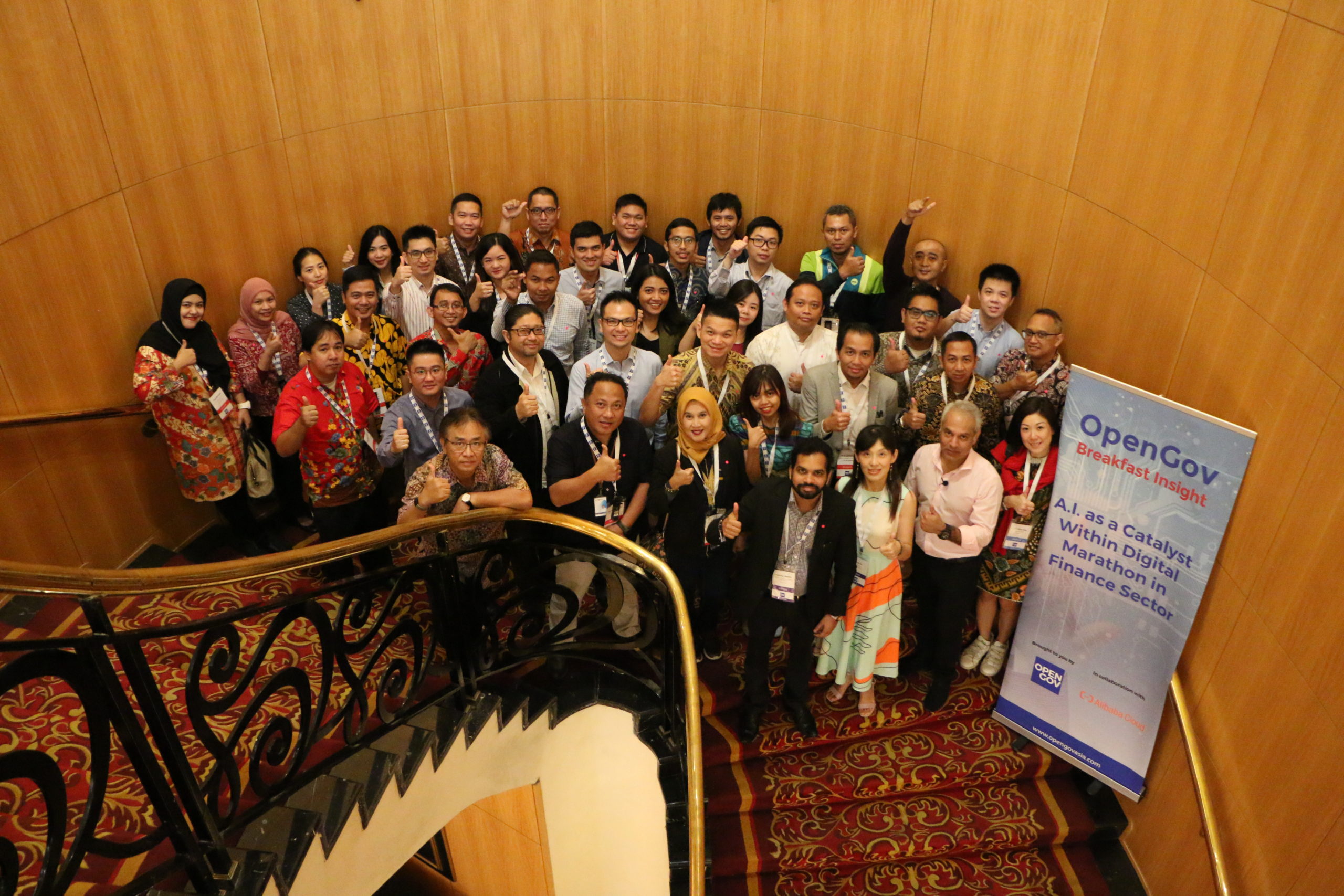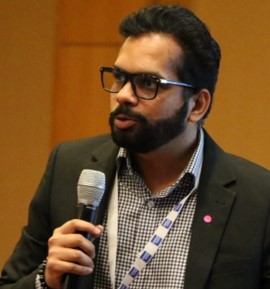
For most companies, the journey towards digital transformation passes through a few major stages of digitalisation before they get to intelligent-solutions phase. As with any race, some contenders take the lead, while others struggle to hit the stride after leaving the starting blocks.
Financial services are contending with multiple challenges tied to regulations, security, geopolitical risks, compliance, legacy systems, disruptive models and technologies, and new competitors. Digital technology has been changing the landscape of financial services over the years.
The way financial institutions operate and how they deliver services to their customers have been influenced by financial technology. Hence, these institutions need to start adapting to these changes or risk becoming irrelevant.
The OpenGov Breakfast Insight: A.I. as a Catalyst Within Digital Marathon in Finance Sector which held on February 20, at the JW Marriott Hotel Jakarta, in conjunction with Alibaba Cloud, gave insights as to how organisations could jump-start or adapt their technology game plan to hit their stride faster, smoother and efficiently.
Enhancing customer experience with AI

The financial sector has seen old-fashioned processes which are time-consuming and requires a lot of paperwork. Legacy systems which have been intact for a long time making it hard for the adoption of new technology.
But it is increasingly being understood that adopting technology and undergoing transformation is imperative for companies to stay competitive.
Mohit Sagar, Managing Director and Editor-in-Chief at OpenGov Asia, said that the top obstacles for AI adoption are the lack of a strategic approach for adopting AI, enterprise maturity, and the fear of the unknown.
Presenting on behalf of Narasimhan Parthasarathy, Chief Technology Officer at FWD Insurance, who was unable to attend the event, Mohit said that customers are to be understood with the digital touch.
Taking a look at digital insurance transaction, it involves interactions with customers which averages at 2-3 minutes. During this short time span, understanding the customer profile, their needs and ensuring that they have a good experience is of priority.
Technology such as chatbots and e-signatures will help organisations understand their customers and serve them better with a digital touch. The transition undertaken is to an infrastructure which is AI-driven and is a self-healing architecture.
Mohit stressed that the best data is found in interactions with customers and hence customer satisfaction is key to building an organisation’s brand.
Building on this data within the financial sector requires technologies such as cloud-based AI and data analytics. These technologies provide companies with the ease of not having to develop their own AI application and more cost-efficiency. The financial sector can also use AI to enhance the customer experience as well.
Mohit said that the mindset of technology expenditure helping companies to achieve their desired outcome should be adopted. Companies should understand how to weave technology into their business process and create the best opportunities out of it.
Data is the new oil. AI refines the new oil

Helping customers undergo digital transformation, this was the customer journey shared by Pradeep Menon, Director of Big Data and AI Solutions at Alibaba Cloud. He said that while customers possess the right attitude to change systems and models using technologies, they do not have an idea of how to go about doing so.
Pradeep shared on the different types of customers at different stages of the transformation journey:
Beginners are sceptical of the business value of advanced digital technologies. While they may be carrying out some experiments, they mostly have an immature digital culture. They have the lowest digital and leadership capabilities.
Fashionistas have many advanced digital features in silos but do not possess an overarching vision. They have underdeveloped coordination and their digital culture may exist in silos. Their digital capabilities are stronger than their leadership ones.
Conservatives have a digital vision, but it remains underdeveloped. They are dominated by traditional digital capabilities, with only a few advanced ones. Strong governance exists across silos and active steps are taken to build digital skills and culture. They have stronger leadership capabilities than digital capabilities.
Digital Masters have both strong digital and leadership capabilities. They have an overarching digital vision. They implement many digital initiatives, generating measurable value and crossing silos. Having strong digital governance and solid digital culture are part of their capabilities.
Pradeep stressed that successful AI transformations require data, business and cultural transformations. Having the right tools and the feasibility of the transformation journey are important factors of consideration that organisations have to take note of.
Cloud accelerates the journey of getting data into the right place and to the right people. Organisations should study use cases and identify how they resonate with their own business needs. This is to be followed by having a data ecosystem, which will require the breaking down of data silos and identifying high-value data. The right tools and techniques are to be used together with a fail-fast approach. Workflow integration will see the integration of AI into workplace processes and the optimisation of the human/machine interface. Having done all, adopting an open collaborative culture will allow organisations to build trust in AI insights.
“Data is the new oil. AI refines the new oil,” said Pradeep.
Where are organisations at?
Many organisations are working in silos for the adoption of cloud technology. While there are some departments which use cloud for specific projects, there is not a specific direction taken for cloud adoption.
Privacy and security concerns on data access and control were quoted as top reasons for the hesitation of cloud adoption and moving data to the cloud platform.
Following a traditional data strategy is the stage at which most organisations are at. They have a central team that manages the data. A data warehouse is in place too and all the analytics are driven through the data warehouse.
Having a skeletal team of a few data scientists/analysts embedded within the business units is the common approach taken by companies. In addition, they fairly use data and data analytic tools for decision-making. While data is used in the decision-making process, data analysis is done primarily in a manual process.
One of the reasons that this could be attributed to is the poor quality and availability of data that prevents organisations from harnessing data assets.
Other technologies such as machine learning and AI are not used at all in some organisations. Others are using these technologies in experimental stages but are not integrated with the business process.
Either a ‘no process’ or a waterfall-model framework is mostly followed for the deployment of machine learning and AI projects. Organisations which use the former do not have a defined process for ML projects.
Alibaba Cloud and its services

Jessie Yu, Senior Product Lead at Alibaba Cloud, shared that Alibaba Cloud presently has two data centres in Jakarta and there are plans to launch a third one this year.
She gave insights as to how Alibaba cloud provides organisations with suitable infrastructure, according to their business needs, while staying in compliance with the local regulations.
Jessie also provided use cases of organisations leveraging data analytics and driving insights from their data, on top of their cloud infrastructures.
Utilise AI and data with the right technologies and methods
Looking ahead in the transformation journey, it all comes down to how data is being utilised and of the technologies that are used. Businesses should adopt the mindset of adopting ways that will allow them to use their data in the most cost-efficient way while optimising their business processes and creating big value out of it.
















